Jewish Parenting Books |
If you wish to purchase any of these books, click on either the title or the book cover to be directed to Amazon.com. As a warning, I have put up pictures of the book covers to give you somewhat an idea of the style of each book (I know, I know. "Don't judge a book by its cover") so the pages may load slowly, depending on the speed of your internet connection.
For more books on parenting issues, see Bar/Bat Mitzvah Books for Parents
For parenting books geared towards Jewish-Christian couples, see Interfaith Books
If this page came up without frames, Click here to see the complete website
Other Pages of Interest:
Easy Reader and Picture Books:
Jewish Children's Books (General) |
Jewish Board Books |
Biblical Stories for Children |
Jewish Holiday Books |
Jewish Family Cookbooks |
Folktales and Talmudic Stories for Children |
Jewish Life Books (Mitzvot, Keeping Kosher, etc.) |
Jewish Life Cycle Books |
Family Haggadahs |
Children's Prayerbooks |
Introductory Hebrew Books |
Jewish History and Historical Fiction Picture Books |
Israel Books
Middle School and YA Books:
Bar Mitzvah Books |
Jewish Fiction |
Historical Fiction |
Torah Study |
Prayer and Jewish Life Books |
Jewish Holidays |
Jewish Biographies |
Jewish History Books |
Holocaust Books for Teens |
Israel Books
Jewish Books for Children |
Bar Mitzvah Books |
Jewish Parenting Books |
Jewish Music for Children |
Jewish Videos |
Jewish Toys and Gifts |
Jewish Gift Baskets and Gourmet Food |
Jewish Jewelry |
Amazon.com Coupons, Promotions, and Sales
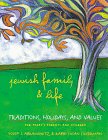
Jewish Family & Life :
Traditions, Holidays, and Values for Today's Parents and Children
By Yosef I. Abramowitz & Susan Silverman
Jewish Family and Life: Traditions, Holidays, and Values for Today's Parents and Children has become the definitive book for parents to turn to for sound advice on important and current parenting issues. It dispenses invaluable information that is relevant to Jewish families today, whether the family has a mixed marriage, two parents, a single parent, or adoptive parents. The book's three parts--Traditions, Holidays and Values--investigate contemporary issues in raising children and show concrete ways in which Judaism can play a practical role in enriching a family's spiritual and moral education. Each chapter includes lively, hands-on activities that you can do with your kids and simultaneously instill vital cultural and religious education. Vetted by a prestigious advisory board that is co-chaired by Nobel Prize-winner Elie Weisel, this book with help unify the family and re-establish rich traditions that have been lost over the generations.
Description from Publisher
For many centuries, Jews lived as tiny minorities or in such small communities that often there was no common place such as a synagogue to celebrate life-cycle events and holidays. Family-based home celebrations therefore became part of Jewish life. Many Jews are still isolated and need guidance in developing a home life that revolves around Jewish practices and festivals. These books have been developed to bridge this gap. The Rhythm of Time answers many of the whys and wherefores of Jewish living. The book covers life-cycle events in detail and follows with an excellent overview of the most important Jewish holidays, Jewish observance in the home, and recipes for food to serve at lifecycle events and major holidays. Award-winning journalist Abramowitz and wife Silverman here apply the down-to-earth, hands-on approach of their web site . The book, divided into Traditions, Holidays, and Values, will speak to young parents trying to establish a Jewish home life. The "Hands on Judaism" section at the end of each chapter provides an opportunity for readers to extend their understanding of the information provided. An annotated resource list by topic, a listing of major American Jewish organizations, and a lengthy glossary round out the volume. Contemporary readers will find these books much livelier and more inviting in format than older treatments of the same topic. Public libraries will definitely want one or both.
Description from Library Journal

How to Be a Jewish Parent :
A Practical Handbook for Family Life
By Anita Diamant
"Parenting is a wholly human practice, and a holy one." This description of parenting comes from the Preface of How to Be a Jewish Parent by Anita Diamant, with Karen Kushner. At a time when statistics predict continued dilution of Jewish identity, when many "discussions of Jewish parenting seem like a last-ditch effort to preserve an endangered way of life," Diamant and Kushner instead consider parenting to be the project of "raising healthy, joyful human beings within our rich, diverse, life-giving tradition." The first part of the book, "Parents as Teachers," describes how to create Jewish spaces within the home, how to involve children in a Jewish community, and how to teach them about the Jewish calendar. The second part of the book, "Ages and Stages," addresses the particular challenges of raising children in various age groups. And the third section, "Modern Life," speaks to some particularly challenging situations, such as physical, mental, and learning disabilities. Throughout, Diamant and Kushner combine insights from scripture, psychology, education, and everyday experience. Like Diamant's previous books, How to Be a Jewish Parent arrives as the definitive reference in its field.
Description from Amazon.com
If you are, or hope to be, a Jewish parent in more than name, you have a lot of decisions to make. So many choices! But you can have no better guide to this wealth of opportunity than Anita Diamant.
The author of popular books on Jewish weddings and baby rituals, Diamant now Joins with family therapist Karen Kushner to help you through the next steps. They give creative, practical answers to these and many other questions, provide guidance on how to foster Jewish decision making for children of all ages, describe how to make your home a "Jewish space," and explain the importance of synagogue membership, holiday celebrations, community service, and other family activities.
Diamant and Kushner draw from many sources to describe the practices, customs, and values that go into creating a Jewish home. They combine insights from Jewish tradition with contemporary developmental thinking about how children learn and grow. They provide addresses (including Web sites) where you can find specific information and other resources. And since experience may be the best of all teachers, they share their own and other parents' stories and observations. For Diamant and Kushner, the number-one goal of How to Be a Jewish Parent is to give parents (and grandparents) guideposts to raising joyful children within the rich tradition of the Jewish faith and culture. No Jewish family should be without it.
Description from Publisher

The New Jewish Baby Book :
Names, Ceremonies, & Customs
A Guide for Today's Families
By Anita Diamant
Each couple anticipating the arrival of a child is tuned into the Jewish saying that, "With each child, the world begins anew." Planning for the arrival of a newborn is filled with hope, excitement, nervousness, and profound love. Beyond these wonderful feelings are all the reality issues of how to choose a name and how to welcome this new being into the family and community. For Jewish families expecting a new arrival, Anita Diamant's The Jewish Baby Book is an invaluable resource.
Particularly helpful are a myriad ideas for ritual welcoming ceremonies for both boys and girls. The Brit Millah (Covenant of Circumcision) ceremony for boys has been in use since Biblical times. There must not be a parent through the ages who hasn't agonized over this ritual. The New Jewish Baby Book provides a sensitive assessment of this ancient ceremony, bringing contemporary questions and issues to the discussion of circumcision in an attempt to help couples come to terms with this practice. For those anticipating having a boy, reading the section on the Brit Millah will help families understand the ceremony and know what to expect, including a checklist of items that need to be on hand. Until relatively recently, there was no official ceremony to welcome a girl into the Jewish community. The New Jewish Baby Book was one of the first resources published to provide ideas, prayers, blessings, and readings for a Brit Bat (Covenant for a Daughter) ceremony. For this, Anita Diamant is to be commended.
In addition to enhancing traditional ceremonies with contemporary prayers, The Jewish Baby Book suggests other ways of beautifying the arrival of a new born, whether with hand-crafted ritual objects or with a unique and personalized birth announcement with a Jewish look. The book also addresses the reality of an increased intermarriage rate in modern times, raising common concerns when some family members are unfamiliar with Jewish ritual and practice. Also addressed are adoption issues, ways to include extended family members in the welcoming of a new born, and genetic diseases for which Jewish couples should be tested and aware of. All of these issues are discussed with Anita's usual thoroughness, sensitivity and compassion.
Description from Amazon.com Customer Review
Diamant's pioneering The Jewish Baby Book was a highly practical guide for liberal Jewish parents-to-be and new parents. It concerned choosing traditional and modern Jewish names; ceremonies and celebrations, including birth announcements and the Brit Milah (convenant of circumcision); the issues of infertility and genetic testing; adoption; and recommendations for celebrating the baby's first year in a meaningfully Jewish way. Diamant has now revised and expanded that excellent book to include handouts to copy for ceremonies, a special section for interfaith families, and new ceremonies for girls. Still the only book in its field, this is highly recommended for all libraries serving Jewish patrons
Description from Library Journal
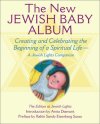
The New Jewish Baby Memory Album: A Jewish Lights Album for Celebrating and Creating the Beginning of a Spiritual Life
By Jewish Lights Publishing
(Introduction by Anita Diamant, Preface by Sandy Eisenberg Sasso)
There are enough baby memory books available today to fill a nursery, but finding one that acknowledges birth as a spiritual celebration is like trying to find a binky in the bottom of the diaper bag.
More than just a memory book, The New Jewish Baby Album shows you how--and why it's important--to create a Jewish home and a Jewish life. It includes a section to describe the naming ceremony, space to write encouragements, and pages for writing original blessings and creating original prayers, as well as meaningful quotes throughout.
Other highlights include a section for the parents to express personal prayers for the baby; pages for each of the major Jewish holidays; a family tree; room for photos; space to commemorate baby's first Shabbat at home; and much more.
This is the perfect baby book for any Jewish family, a spiritual keepsake that will be treasured for generations.
Description from Publisher

Teaching Your Children About G-d:
A Modern Jewish Approach
Many parents find it easier to talk to their children about
sex and other intimate matters than to answer questions
about God, prayer, good, and evil. In fact, parents may feel
they don't know the answers to such questions for themselves,
much less for their young children. In Teaching Your Children
About God, Rabbi David Wolpe shows Jewish parents how to
openly explore the idea of God with their children. Through
poignant anecdotes and practical exercises, Wolpe teaches how
parents can guide children in the practice of prayer and
create an atomosphere in which children feel comfortable
questioning and wondering about God, life, and death. Wolpe
also offers invaluable insights into children's spiritual
needs, reveals the powerful effect faith can have on a child's
self-esteem, and enables parents to understand their children's
fears, dreams, and hopes. Perhaps most important, this wise
and potentially life-changing book shows parents who may feel
something missing in their own spiritual lives that it is
possible to nourish their own souls even as they nurture their
children's.
Description from Publisher

Becoming a Jewish Parent :
How to Explore Spirituality and Tradition With Your Children
By Rabbi Daniel Gordis
A professor and rabbi tackles the topic of raising Jewish children in a secular society. Gordis is particularly clear-sighted on this issue and doesn't miss hitting any hot buttons. For instance, he understands that many Jews are ambivalent about their religion, and he explores the difficulties that develop when parents try to convey the importance of traditions that they either don't fully understand or don't accept. Another issue he confronts is the problem of raising girls in a religion that is not always female-friendly. Gordis' willingness to tackle the tough subjects notwithstanding, most of his book's thrust is in the direction of promoting the positive, not parrying the negative. Whether its introducing the holidays, exploring the history, or showing children how to live Jewish lives, Gordis offers useful, often creative ideas. His book is a responsive answer to many parents' questions.
Description from Booklist
Rabbi Gordis, dean of the University of Judaisms rabbinical school, has written extensively about why adult Jews should care about Judaism (Does the World Need the Jews?, 1997, etc.). In his latest book, he explains why parents should care about their children's Jewish identity and suggests strategies for getting the kids themselves enthusiastic about Judaism. Gordis provides some basics for those parents whose memories of Hebrew school are fuzzy: When is Purim, why do Jews fast the day before, and what are those triangular pastries people eat at Purim-time? What is that archaic Aramaic document our rabbi wants to read at our son's wedding? But this is more than a how-to. In characteristic fashion, Gordis addresses the larger spiritual questions that lurk beneath the surface of seemingly innocent hamantashen: Should we bother introducing our kids to the Jewish G-d if ``we're sure we don't believe''? What role should rituals invented by men zillions of years ago play in our life? Though aimed at Jewish parents, Raising Jewish Children will prove thought-provoking for a wider audience. Gordis recounts his daughter's asking him, " `What was G-d doing when she was a little girl?' . . . . Talia's question . . . taught me that when we nonchalantly call G-d `He,' we steal something from our little girls." That is just one of many lessons in Gordis's book that will benefit both Jews and Gentiles, parents and those with no plans to procreate.
Description from Kirkus Reviews
How do you talk to your kids about God?
Raising Jewish children in today's secular culture poses unique and serious challenges. How do you instill a positive, vital sense of identity, religion, and heritage without turning off your kids or overwhelming them? How do you explain what it means to be Jewish if you are ambivalent about it yourself? And perhaps most important, how do parents who have little or no formal religious training themselves pass on rich, multilayered traditions that may have been missing from their own childhood experiences? Filled with delightful and inspiring anecdotes, thoughtful information about the history, holidays, and traditions that shape Judaism, as well as a useful glossary and thorough reference section, Becoming a Jewish Parent offers guidance on such topics as:
- Using ritual to make space for feeling
- Talking about G-d when we have our doubts
- Incorporating girls into what has been a primarily male tradition
- Becoming part of a community that supports your ideals
Becoming a Jewish Parent is the book to turn to at every phase of your family's spiritual quest.
Description from Publisher

The Blessing of a Skinned Knee:
Using Jewish Teachings to Raise Self-Reliant Children
By Wendy Mogel
Every parent hopes their child will be self-reliant, optimistic, and well mannered, a challenge in our current culture. Clinical psychologist and Jewish educator Wendy Mogel distills the ancient teachings of the Torah, the Talmud, important Jewish thinkers, and contemporary psychological insights into nine blessings that address key parenting issues such as:
- determining realistic expectations for each child
- respect for adults
- chores
- mealtime battles
- coping with frustration
- developing independence and self-control
- resisting over-scheduling and over-indulgence
The Blessing of a Skinned Knee guides us toward effective, enlightened parenting in an increasingly speedy, material, and competitive age.
Description from Publisher

When Children Ask About G-d :
A Guide for Parents Who Don't Always Have All the Answers
By Harold S. Kushner
By the best-selling author of When
Bad Things Happen to Good People
A respected rabbi and author advises parents on talking to children aobut their fears, fantasies, hopes, and questions. Kushner believes we get into trouble when we teach children to think of God as a person who controls everything in the world. He offers some affirmative ways of meeting God with this in mind. A book for every family.
Description from Jewish Book World
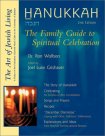
Hanukkah: The Family Guide to Spiritual Celebration
By Dr. Ron Wolfson
This comprehensive guide to Hanukkah, now in its second edition, will be appreciated by countless Jewish families seeking creative and memorable ways to celebrate the holiday. It opens with Wolfson's nostalgic foreword about Hanukkahs past, recounting how the experience of growing up Jewish in Omaha, Nebraska, helped him to articulate and understand his faith-and how he has sought, through the observance of Hanukkah, to pass on that identity to his children. What follows is a fine and resourceful manual about all aspects of the celebration, including recipes, crafts, gifts, games, prayers, decorations and songs. There are even corny Hanukkah jokes ("oil's well that ends well") and whole chapters on food: "If it is a real Jewish event, it involves food," Wolfson tells us. Especially helpful is a section offering parents suggestions to help their children understand the "December Dilemmas" of Hanukkah and Christmas.
Description from Publishers Weekly
Create a meaningful and happy Hanukkah in your home--with story, celebration, food and song.
This newly-designed, easy-to-use edition of a classic spiritual sourcebook offers updated information, more family ideas, and new resources for every aspect of your holiday celebration. Information on every aspect of Hanukkah is covered, including:
- The story of Hanukkah
- Celebrating--for families of every constellation
- Songs and prayers in English, Hebrew, and Yiddish (with clear transliterations
- Recipes for traditional and modern Hanukkah foods
- "December Dilemmas"--coping with other traditions' celebrations
- Firsthand explanations and ideas from real-life families around America
Hands-on advice and practical suggestions invite families into Hanukkah's spirituality and joys, from the making of luscious latkes and Hanukkah crafts to the stories of the heroism and the miracle that are remembered every year with the lighting of the hanukkiyah.
Description from Publisher

Celebrating Your New Jewish Daughter :
Creating Jewish Ways to Welcome Baby Girls into the Covenant-New and Traditional Ceremonies
By Debra Nussbaum Cohen
While the brit milah (circumcision) ceremony welcomes baby boys into the Jewish community, no similar standard celebration exists for baby girls. Cohen, a journalist, introduces and collects welcoming ceremonies that have been invented over the past 30 years, unearthed from Jewish communities around the world and adapted from other rituals. The challenge of the simchat bat (celebration of a daughter), she says, is that its innovative nature "extends to each of us the opportunity to compose the ceremony that feels best suited to our family's needs." To guide parents, grandparents, rabbis and cantors, Cohen has compiled an array of prayers, readings, blessings, songs and rituals that concretize the child's entry into the community. Hebrew texts are accompanied by translations and transliterations. Complete sample ceremonies include Sephardic, Orthodox, humanist and a "modern mikvah ceremony" in which the child is immersed in a vessel representing the traditional ritual bath. The ceremonies that work best, Cohen notes, are rooted in modern poems and songs as well as classical elements of Jewish liturgy. This resource will guide families at one of the most joyous moments of their lives.
Description from Publishers Weekly

To Raise a Jewish Child :
A Guide for Parents
By Hayim Halevy Donin
In a society with so many distractions, how can American Jewish parents teach their children to know and appreciate what it means to be a Jew? Updated with current resource material, this practical book provides help in finding and evaluating a Hebrew school, in dealing with secular peer pressure, and in planning observances in the home.
Description from Publisher
This book has had more impact on me than any other one book on any Jewish subject. I myself went to afternoon Hebrew schools, and was nodding throughout Donin's discussion of why they are so ineffective. My two kids are now in Jewish dayschools, and hopefully will be for the rest of their educational lives. If you're worried that your kids will either turn out "too Jewish" or "not Jewish enough," this book will alleviate fears and provide an accessible path to creating a Jewish way of life that resonates with your own level of spirituality and committment. Whether or not you have children, if you hope to be part of a Jewish community, this book is a warm and heartfelt starting point.
Description from Amazon.com Customer Review

An Allowance Is Not a Bribe
And Other Helpful Hints for Raising Responsible Jewish Children
By Allan M. Gonsher
In recent years, many books have been published on the topic of Jewish parenting. What sets this book apart from others is the powerful message of its author, Allan Gonsher, who is an experienced family therapist with the dual perspective of a practicing Jew and a clinician trained in psychology and inter-personal dynamics. An Allowance is Not a Bribe is the result of this unique viewpoint on Jewish parenting.
Description from Publisher

The Jewish Holiday Home Companion :
A Parents Guide to Family Celebration
By Nicolas D. Mandelkern
A friendly, concise introduction to Jewish holiday celebration: everything from building a sukkah, to enjoying the warmth of Shabbat with family, to celebrating Hanukkah without making it seem like a Jewish version of X-mas.
Includes holiday songs, recipes, blessings and photographs. Contents: Rosh Hashanah, Yom Kippur, Sukkot, Simhat Torah, Hanukkah, Tu B'Shevat, Purim, Passover, Yom Hashoah, Yom Ha'atzma'ut (Israel Independence Day), Shavuot, and Shabbat.
Description from Amazon.com
An easy to use, very practical guide to the religious and family customs of the holidays. The book is an ideal and cordial source of help for those who remember the practices of the faith from their own childhood and wish now to reconnect with those traditions as part of the rearing of their own children
Description from Publishers Weekly
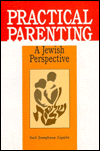
Practical Parenting:
A Jewish Perspective
By Gail J. Lipsitz
In articles in the Baltimore Jewish Times and other papers, Lipsitz has been offering insights and information on raising children. Now she and her collaborators, mostly fellow workers at Jewish Family Services of Central Maryland, offer these articles and more in book format. Much of what Lipsitz says can, of course, be used by any parent, but she clearly addresses the particular circumstances of Jewish parents. Along with chapters on adoption, sibling struggles, and school fears, there are others on anti-Semitism, the "December Dilemma," and Passover. References to the Bible and to the Talmud abound. A fine acquisition for any library with Jewish parents among its clientele.
Description from Library Journal
Taking a fresh approach to parenting, this book presents thoughtful insights and sound practical advice for parents of all faiths in today's world. Each of the 24 chapters explores a specific parenting issue. Drawing on the clinical expertise of professional social workers at Jewish Family Services of Central Maryland, the author writes in an accessible style enlivened by wit and the shared experience of parenthood. Traditional and modern Jewish sources and voices enrich the discussion as their relevance to contemporary family life is shown, without taking ideological stances. Parents will appreciate the emphasis on intergenerational communication and a preventive approach to problems, as well as the helpful tips after each chapter and supplementary references at the end of the book. Practical Parenting: A Jewish Perspective is a valuable new resource for parents at any stage of the life cycle; parent support groups; professionals in the fields of social work, mental health, and communal service; and educators.
Description from Publisher
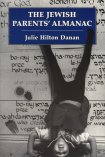
The Jewish Parents' Almanac
By Julie Hilton Danan
Danan is a gifted and highly regarded Jewish educator. She has written a comprehensive guide to Jewish parenting, filled with a tremendous amount of information, enthusiasm, practical ideas, wise advice, and a fantastic quantity of resources. This book is essential reading for Jewish parents.
Description from Publisher
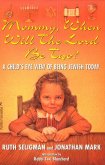
Mommy, When Will the Lord Be Two?: A Child's Eye View of Being Jewish Today
By Ruth Seligman and Jonathan Mark
From the Torah to Jewish holidays, a collection of children's thoughts on Judaism reflect how young minds grapple with issues of religion, rituals and a way of life.
Description from Publisher
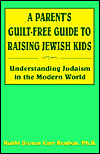
Parents Guilt-Free Guide to Raising Jewish Kids: Understanding Judaism in the Modern World
By Steven Carr Reuben
This book reveals the three key rules for raising Jewishly ethical children, and the three holidays that can help you teach them the most important values of Judaism. Designed for Jews and non-Jews alike, it is a non-judgmental guide to being a partner in transmitting Jewish culture, tradition, and identity to your children in an authentic and accessible way. Throughout this book you will find suggestions for creating a warm, personal Jewish lifestyle that can add to the richness and quality of your child-rearing experiences. It is a practical guide to raising children with a positive Jewish self-image.
Description from Publisher
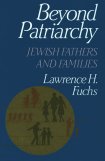
Beyond Patriarchy: Jewish Fathers and Families
By Lawrence H. Fuchs
Is patriarchy necessary to ensure responsible fathering?
Lawrence H. Fuchs, author of Family Matters, argues that the link between male dominance and fatherhood is no longer iron-clad. Analyzing the universality of patriarchy and its incentives for cultural fatherhood, Fuchs concedes that the importance of biological differences between the sexes was a possible, even plausible, basis for the evolution of patriarchy. But in this timely work he imagines a new paradigm of fatherhood for a post-patriarchal age, one inspired by the history of Jewish patriarchy.
Two millennia ago the rabbis established the strategies to curb the extreme abuses of patriarchy found in all civilizations. They did so by according wives significant sexual and economic rights. In the last two centuries as Jews became more integrated into the societies in which they lived, their unique variation of patriarchy was disrupted.
Fuchs argues that the Jewish story sets the precedent for fundamental change in the nature of patriarchy today, thus breaking what may have been the evolutionary connection between male dominance and incentives for fatherhood. It is Fuchs's startling conclusion that the Jewish precedent points to the next step in evolution: fathers without patriarchy.
Description from Publisher
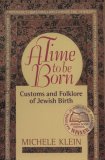
A Time to Be Born: Customs and Folklore of Jewish Birth
By Michele Klein
Winner of the 1998 National Book Award, A Time to Be Born is unlike any other book on childbirth in its Jewish perspective. Michele Klein uses many rich sources, including prayers, folktales, folk remedies, as well as biblical, rabbinical, and mystical literature, to explore childbirth's role within Jewish tradition.
This book reveals the values, ideas, and customs that characterize childbirth among Jews. By bringing a child into the world, new life is celebrated, and for Jews, this birth rests on the central pillars of Jewish life: the sanctity of God, Torah, and of the community.
What are the traditional attitudes toward contraception and abortion? What does our heritage teach us about pregnancy and the means to ensure the safe birth of a baby? What role did midwives play? And what rituals were enacted as part of the celebration of a newborn? All these questions are answered as Jewish beliefs and customs are examined.
Today, a growing number of Jews are seeking new ways to better express their spirituality. A Time to Be Born is the book for them, especially for expectant families, because it responds to their yearning to uncover and realize the rich heritage and traditions their culture can bring to the miracle of birth.
Description from Publisher
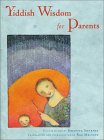
Yiddish Wisdom for Parents
Yiddishe Khokhme Far Eltern
By Kristina Swarner (Illustrator) & Rae Meltzer (Translator)
This beautifully illustrated volume collects more than 100 folk sayings from the Old Country--in Yiddish and English--celebrating the bond between parent and child. An intimate treasury of enduring advice and observation, Yiddish Wisdom for Parents encompasses the joys, and trials, of raising and loving children in proverbs poignant (A child's wisdom is also wisdom/A kind's khokhme iz oykhet khokhme), practical (First learn, then teach/Ersht lern zikh, un dan lernen ondere), and whimsical (Goofy goose, goofy goslings/Fardreyte gandz, fardreyte gendzl). With charming watercolors by Kristina Swarner illuminating the proverbs, this warm and witty book is the perfect gift for Passover, showers, Chanukah, or any special occasion.
Description from Publisher

The Complete Book of Hebrew Baby Names
By Smadar Shir Sidi
A wide selection fo more than 5,000 traditional and contemporary Hebrew names along with advice on choosing names and nicknames, ceremonies, tranlations and more.
Description from Publisher
I have to confess right up front that I have a "thing" for names. Therefore, I own lots and lots of "name your baby" books. For naming your Jewish baby, this book is the best! The list of names is extensive with lots of uncommon (here in the States) choices. The book provides the Hebrew spelling as well as the English spelling. There also is a rating system showing the name's popularity in the U.S. and in Israel. If you're looking for a name for your Jewish baby and you want to go beyond the usual Sarah, Rebecca, Leah, Rachel, Jacob, etc., you need this book!
Description from Amazon.com Customer Review
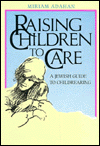
Raising Children to Care :
A Jewish Guide to Childrearing
By Miriam Adahan
A vital text that helps Jewish parents train themselves and their children to become loving, self-disciplined, and responsible.
Description from Publisher

Out of the Mouths of Babes:
What Children Can Teach Us About Spirituality, Jewish Issues and the Jewish People
By Rabbi Mark S. Bloom
Rabbi Bloom's first book is the Jewish answer to
Kids Say the Darndest Things. Each chapter features a different lesson about Judaism or spirituality as seen through the eyes of the many children Rabbi Bloom has taught in congregational life. The oft-quoted line "out of the mouths of babes" comes from Psalm 6. The way it is used colloquially it means "can you believe this little person just said that? How can one so young seemingly possess so much wisdom?" More and more, however, in our increasingly complicated world, it takes a child's stark simplicity to make adults see the wisdom and wonder in this world. This book gives 30+ opportunities for adults to become enlightened by our children.
Description from Publisher

Raising a Spiritual Child: A Jewish Perspective
By Stephanie Hubert Schneider, PhD
Parents have the important (and daunting) task of giving their children a spiritual foundation for life. Raising a Spiritual Child: A Jewish Perspective gives parents the tools they need to guide their children along this path to a personal faith. Based on five years of research with hundreds of adults and young people, Dr. Schneider shows parents of preschoolers through teens how to match a child's interests to one of four personal approaches to faith. An easy-to-use questionnaire and numerous examples provide step-by-step guidance to parents, while hundreds of resources give concrete ideas for each age group. Parents get help too---included are tools to help parents fortify their own spirituality, even as they nurture their children's faith.
Description from Publisher
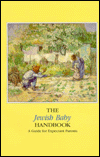
The Jewish Baby Handbook: A Guide for Expectant Parents
By Douglas Weber
As the big day draws near, expectant parents will treasure this priceless guide.
- What is a brit milah?
- What kind of ceremony welcomes a Jewish daughter?
- What is a wimpel?
- What are parents' obligations to their children?
Welcome a new family to the congregation.
Description from Publisher
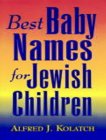
Best Baby Names for Jewish Children
By Alfred J. Kolatch
A handy trade paperback that presents thousands of appealing names from which parents can make a suitable selection for their newborns. Each entry gives the origin and meaning of the name and suggests one Hebrew equivalent. Includes Anglicized forms of the latest and most popular names used in Israel. A must for prospective parents.
Description from Publisher
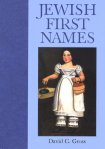
Jewish First Names
By David C. Gross
A list of 1,300 Jewish first names for boys and girls from Hebrew, Yiddish, Aramaic, and various European languages. This charming gift edition gives the origin and etymology of each name as well as nicknames. The book includes new name forms like Davida or Davidine - 'beloved' (feminine version of David) as well as traditional names like Raphael - 'God has healed.'
hardcover.
Description from Publisher
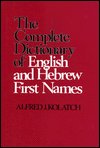
Complete Dictionary of English and Hebrew First Names
By Alfred J. Kolatch
This dictionary contains Hebrew and English names together with an analysis of their meanings and origins. Included among the more than 11,000 entries are a large number of biblical names suitable for use today, plus practically every Hebrew first name currently in use in Israel. Popular talmudic names and Yiddish names are also included. The correct spelling of Hebrew and Yiddish names is indicated in Hebrew script immediately following each main entry. Also features a comprehensive Hebrew Name Vocabulary, in which one will find Hebrew (and Yiddish) names grouped according to meaning and transliterated into English.
Description from Publisher
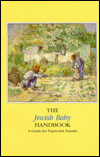
The Jewish Baby Handbook:
A Guide for Expectant Parents
By Douglas Weber
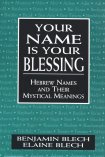
Your Name Is Your Blessing: Hebrew Names and Their Mystical Meanings
By Rabbi Benjamin and Elaine Blech
Kabbalah, or Jewish mysticism, long ago realized that a person's name is far more than a means of identification. Although given at birth by parents, it carries within it Divine prophecy and providence. Indeed, after death, one of the first questions the Heavenly Court asks is if we lived up to the meanings–as well as responsibility–of our names. . . .
Your Name Is Your Blessing: Hebrew Names and Their Mystical Meanings is the first book of Hebrew names that offers not only a comprehensive list of ancient and modern names with their meanings, but also a mystical insight, by way of gematria (the numerical value of letters), into the personality, the soul, the prophetic destiny, and the blessing of every person based on his or her name.
In the kabbalistic system of gematria, wherein letters speak to us through their numerical meaning, the very word in Hebrew for name, shem, is the same in number as the word sefer, a book. A name has hidden in it the story of the book of one's life. To decode it is to have an almost G-dly insight into oneself or another human being.
In Your Name Is Your Blessing, we provide the answers needed for this analysis. Every name has alongside of it not only its simple meaning but also its gematria–the all important total of its letter components. Connected to it is a biblical word that shares exactly the same total and therefore sheds light on its Torah-based significance. A name and a biblical message become profoundly linked–as if the Torah spoke directly to you. That is then followed by a phrase with a succinct message that also has exactly the same gematria–and hence summarizes in yet another way what one's name expresses.
When all of these–the name's meaning, gematria, biblical word, and equivalent phrase–are viewed together, they allow for an interpretation that may well predict one's future. That serves as the last entry for every name in this book: his or her blessing.
With all of this information, we believe this book is a "must" not only for expectant parents who want to pick the ideal name for their child but for anyone who wants a mystical, profound, and rapid way to know more about others–or perhaps even more importantly about themselves.
Description from Authors
I found this very interesting both as a baby naming book and as an interesting and enlightening (and even fun!) insight into friends' and family names. In addition to the usual content of Hebrew-English name books, this book adds the additional "spin" of giving insight into such names based on the recognized Jewish mystical concept of "gematria" (which Rabbi Blech explains very well in the preface and which uses the numerical value of Hebrew letters and thus of Hebrew words and names to make linkages between different concepts with like numerical values -- I'm not explaining it well, so you'll have to read it there!).
Description from Amazon.com Customer Review
Still can't find what you're looking for? Search Amazon.com's database directly.
©1999-2006
(NOTE: The following links have NOT been placed on the site by the website owners. We have no control over which ads are selected and are not responsible for their religious content.)
For more books on parenting issues, see Bar/Bat Mitzvah Books for Parents
For parenting books geared towards Jewish-Christian couples, see Interfaith Books
If this page came up without frames, Click here to see the complete website
Other Pages of Interest:
Easy Reader and Picture Books:
Jewish Children's Books (General) |
Jewish Board Books |
Biblical Stories for Children |
Jewish Holiday Books |
Jewish Family Cookbooks |
Folktales and Talmudic Stories for Children |
Jewish Life Books (Mitzvot, Keeping Kosher, etc.) |
Jewish Life Cycle Books |
Family Haggadahs |
Children's Prayerbooks |
Introductory Hebrew Books |
Jewish History and Historical Fiction Picture Books |
Israel Books
Middle School and YA Books:
Bar Mitzvah Books |
Jewish Fiction |
Historical Fiction |
Torah Study |
Prayer and Jewish Life Books |
Jewish Holidays |
Jewish Biographies |
Jewish History Books |
Holocaust Books for Teens |
Israel Books
Jewish Books for Children |
Bar Mitzvah Books |
Jewish Parenting Books |
Jewish Music for Children |
Jewish Videos |
Jewish Toys and Gifts |
Jewish Gift Baskets and Gourmet Food |
Jewish Jewelry |
Amazon.com Coupons, Promotions, and Sales
Other Pages of Interest:
Easy Reader and Picture Books:
Jewish Children's Books (General) |
Jewish Board Books |
Biblical Stories for Children |
Jewish Holiday Books |
Jewish Family Cookbooks |
Folktales and Talmudic Stories for Children |
Jewish Life Books (Mitzvot, Keeping Kosher, etc.) |
Jewish Life Cycle Books |
Family Haggadahs |
Children's Prayerbooks |
Introductory Hebrew Books |
Jewish History and Historical Fiction Picture Books |
Israel Books
Middle School and YA Books:
Bar Mitzvah Books |
Jewish Fiction |
Historical Fiction |
Torah Study |
Prayer and Jewish Life Books |
Jewish Holidays |
Jewish Biographies |
Jewish History Books |
Holocaust Books for Teens |
Israel Books
Jewish Books for Children |
Bar Mitzvah Books |
Jewish Parenting Books |
Jewish Music for Children |
Jewish Videos |
Jewish Toys and Gifts |
Jewish Gift Baskets and Gourmet Food |
Jewish Jewelry |
Amazon.com Coupons, Promotions, and Sales
Jewish Children's Books (General) | Jewish Board Books | Biblical Stories for Children | Jewish Holiday Books | Jewish Family Cookbooks | Folktales and Talmudic Stories for Children | Jewish Life Books (Mitzvot, Keeping Kosher, etc.) | Jewish Life Cycle Books | Family Haggadahs | Children's Prayerbooks | Introductory Hebrew Books | Jewish History and Historical Fiction Picture Books | Israel Books
Middle School and YA Books:
Bar Mitzvah Books | Jewish Fiction | Historical Fiction | Torah Study | Prayer and Jewish Life Books | Jewish Holidays | Jewish Biographies | Jewish History Books | Holocaust Books for Teens | Israel Books
Jewish Books for Children | Bar Mitzvah Books | Jewish Parenting Books | Jewish Music for Children | Jewish Videos | Jewish Toys and Gifts | Jewish Gift Baskets and Gourmet Food | Jewish Jewelry | Amazon.com Coupons, Promotions, and Sales
 Jewish Family & Life : Traditions, Holidays, and Values for Today's Parents and Children By Yosef I. Abramowitz & Susan Silverman |
Jewish Family and Life: Traditions, Holidays, and Values for Today's Parents and Children has become the definitive book for parents to turn to for sound advice on important and current parenting issues. It dispenses invaluable information that is relevant to Jewish families today, whether the family has a mixed marriage, two parents, a single parent, or adoptive parents. The book's three parts--Traditions, Holidays and Values--investigate contemporary issues in raising children and show concrete ways in which Judaism can play a practical role in enriching a family's spiritual and moral education. Each chapter includes lively, hands-on activities that you can do with your kids and simultaneously instill vital cultural and religious education. Vetted by a prestigious advisory board that is co-chaired by Nobel Prize-winner Elie Weisel, this book with help unify the family and re-establish rich traditions that have been lost over the generations.
For many centuries, Jews lived as tiny minorities or in such small communities that often there was no common place such as a synagogue to celebrate life-cycle events and holidays. Family-based home celebrations therefore became part of Jewish life. Many Jews are still isolated and need guidance in developing a home life that revolves around Jewish practices and festivals. These books have been developed to bridge this gap. The Rhythm of Time answers many of the whys and wherefores of Jewish living. The book covers life-cycle events in detail and follows with an excellent overview of the most important Jewish holidays, Jewish observance in the home, and recipes for food to serve at lifecycle events and major holidays. Award-winning journalist Abramowitz and wife Silverman here apply the down-to-earth, hands-on approach of their web site . The book, divided into Traditions, Holidays, and Values, will speak to young parents trying to establish a Jewish home life. The "Hands on Judaism" section at the end of each chapter provides an opportunity for readers to extend their understanding of the information provided. An annotated resource list by topic, a listing of major American Jewish organizations, and a lengthy glossary round out the volume. Contemporary readers will find these books much livelier and more inviting in format than older treatments of the same topic. Public libraries will definitely want one or both. |
 How to Be a Jewish Parent : A Practical Handbook for Family Life By Anita Diamant |
"Parenting is a wholly human practice, and a holy one." This description of parenting comes from the Preface of How to Be a Jewish Parent by Anita Diamant, with Karen Kushner. At a time when statistics predict continued dilution of Jewish identity, when many "discussions of Jewish parenting seem like a last-ditch effort to preserve an endangered way of life," Diamant and Kushner instead consider parenting to be the project of "raising healthy, joyful human beings within our rich, diverse, life-giving tradition." The first part of the book, "Parents as Teachers," describes how to create Jewish spaces within the home, how to involve children in a Jewish community, and how to teach them about the Jewish calendar. The second part of the book, "Ages and Stages," addresses the particular challenges of raising children in various age groups. And the third section, "Modern Life," speaks to some particularly challenging situations, such as physical, mental, and learning disabilities. Throughout, Diamant and Kushner combine insights from scripture, psychology, education, and everyday experience. Like Diamant's previous books, How to Be a Jewish Parent arrives as the definitive reference in its field.
If you are, or hope to be, a Jewish parent in more than name, you have a lot of decisions to make. So many choices! But you can have no better guide to this wealth of opportunity than Anita Diamant. The author of popular books on Jewish weddings and baby rituals, Diamant now Joins with family therapist Karen Kushner to help you through the next steps. They give creative, practical answers to these and many other questions, provide guidance on how to foster Jewish decision making for children of all ages, describe how to make your home a "Jewish space," and explain the importance of synagogue membership, holiday celebrations, community service, and other family activities. Diamant and Kushner draw from many sources to describe the practices, customs, and values that go into creating a Jewish home. They combine insights from Jewish tradition with contemporary developmental thinking about how children learn and grow. They provide addresses (including Web sites) where you can find specific information and other resources. And since experience may be the best of all teachers, they share their own and other parents' stories and observations. For Diamant and Kushner, the number-one goal of How to Be a Jewish Parent is to give parents (and grandparents) guideposts to raising joyful children within the rich tradition of the Jewish faith and culture. No Jewish family should be without it. |
 The New Jewish Baby Book : Names, Ceremonies, & Customs A Guide for Today's Families By Anita Diamant |
Each couple anticipating the arrival of a child is tuned into the Jewish saying that, "With each child, the world begins anew." Planning for the arrival of a newborn is filled with hope, excitement, nervousness, and profound love. Beyond these wonderful feelings are all the reality issues of how to choose a name and how to welcome this new being into the family and community. For Jewish families expecting a new arrival, Anita Diamant's The Jewish Baby Book is an invaluable resource.
Particularly helpful are a myriad ideas for ritual welcoming ceremonies for both boys and girls. The Brit Millah (Covenant of Circumcision) ceremony for boys has been in use since Biblical times. There must not be a parent through the ages who hasn't agonized over this ritual. The New Jewish Baby Book provides a sensitive assessment of this ancient ceremony, bringing contemporary questions and issues to the discussion of circumcision in an attempt to help couples come to terms with this practice. For those anticipating having a boy, reading the section on the Brit Millah will help families understand the ceremony and know what to expect, including a checklist of items that need to be on hand. Until relatively recently, there was no official ceremony to welcome a girl into the Jewish community. The New Jewish Baby Book was one of the first resources published to provide ideas, prayers, blessings, and readings for a Brit Bat (Covenant for a Daughter) ceremony. For this, Anita Diamant is to be commended. In addition to enhancing traditional ceremonies with contemporary prayers, The Jewish Baby Book suggests other ways of beautifying the arrival of a new born, whether with hand-crafted ritual objects or with a unique and personalized birth announcement with a Jewish look. The book also addresses the reality of an increased intermarriage rate in modern times, raising common concerns when some family members are unfamiliar with Jewish ritual and practice. Also addressed are adoption issues, ways to include extended family members in the welcoming of a new born, and genetic diseases for which Jewish couples should be tested and aware of. All of these issues are discussed with Anita's usual thoroughness, sensitivity and compassion. Diamant's pioneering The Jewish Baby Book was a highly practical guide for liberal Jewish parents-to-be and new parents. It concerned choosing traditional and modern Jewish names; ceremonies and celebrations, including birth announcements and the Brit Milah (convenant of circumcision); the issues of infertility and genetic testing; adoption; and recommendations for celebrating the baby's first year in a meaningfully Jewish way. Diamant has now revised and expanded that excellent book to include handouts to copy for ceremonies, a special section for interfaith families, and new ceremonies for girls. Still the only book in its field, this is highly recommended for all libraries serving Jewish patrons |
 The New Jewish Baby Memory Album: A Jewish Lights Album for Celebrating and Creating the Beginning of a Spiritual Life By Jewish Lights Publishing (Introduction by Anita Diamant, Preface by Sandy Eisenberg Sasso) |
There are enough baby memory books available today to fill a nursery, but finding one that acknowledges birth as a spiritual celebration is like trying to find a binky in the bottom of the diaper bag.
More than just a memory book, The New Jewish Baby Album shows you how--and why it's important--to create a Jewish home and a Jewish life. It includes a section to describe the naming ceremony, space to write encouragements, and pages for writing original blessings and creating original prayers, as well as meaningful quotes throughout. Other highlights include a section for the parents to express personal prayers for the baby; pages for each of the major Jewish holidays; a family tree; room for photos; space to commemorate baby's first Shabbat at home; and much more. This is the perfect baby book for any Jewish family, a spiritual keepsake that will be treasured for generations. |
 Teaching Your Children About G-d: A Modern Jewish Approach |
Many parents find it easier to talk to their children about
sex and other intimate matters than to answer questions
about God, prayer, good, and evil. In fact, parents may feel
they don't know the answers to such questions for themselves,
much less for their young children. In Teaching Your Children
About God, Rabbi David Wolpe shows Jewish parents how to
openly explore the idea of God with their children. Through
poignant anecdotes and practical exercises, Wolpe teaches how
parents can guide children in the practice of prayer and
create an atomosphere in which children feel comfortable
questioning and wondering about God, life, and death. Wolpe
also offers invaluable insights into children's spiritual
needs, reveals the powerful effect faith can have on a child's
self-esteem, and enables parents to understand their children's
fears, dreams, and hopes. Perhaps most important, this wise
and potentially life-changing book shows parents who may feel
something missing in their own spiritual lives that it is
possible to nourish their own souls even as they nurture their
children's.
|
 Becoming a Jewish Parent : How to Explore Spirituality and Tradition With Your Children By Rabbi Daniel Gordis |
A professor and rabbi tackles the topic of raising Jewish children in a secular society. Gordis is particularly clear-sighted on this issue and doesn't miss hitting any hot buttons. For instance, he understands that many Jews are ambivalent about their religion, and he explores the difficulties that develop when parents try to convey the importance of traditions that they either don't fully understand or don't accept. Another issue he confronts is the problem of raising girls in a religion that is not always female-friendly. Gordis' willingness to tackle the tough subjects notwithstanding, most of his book's thrust is in the direction of promoting the positive, not parrying the negative. Whether its introducing the holidays, exploring the history, or showing children how to live Jewish lives, Gordis offers useful, often creative ideas. His book is a responsive answer to many parents' questions.
Rabbi Gordis, dean of the University of Judaisms rabbinical school, has written extensively about why adult Jews should care about Judaism (Does the World Need the Jews?, 1997, etc.). In his latest book, he explains why parents should care about their children's Jewish identity and suggests strategies for getting the kids themselves enthusiastic about Judaism. Gordis provides some basics for those parents whose memories of Hebrew school are fuzzy: When is Purim, why do Jews fast the day before, and what are those triangular pastries people eat at Purim-time? What is that archaic Aramaic document our rabbi wants to read at our son's wedding? But this is more than a how-to. In characteristic fashion, Gordis addresses the larger spiritual questions that lurk beneath the surface of seemingly innocent hamantashen: Should we bother introducing our kids to the Jewish G-d if ``we're sure we don't believe''? What role should rituals invented by men zillions of years ago play in our life? Though aimed at Jewish parents, Raising Jewish Children will prove thought-provoking for a wider audience. Gordis recounts his daughter's asking him, " `What was G-d doing when she was a little girl?' . . . . Talia's question . . . taught me that when we nonchalantly call G-d `He,' we steal something from our little girls." That is just one of many lessons in Gordis's book that will benefit both Jews and Gentiles, parents and those with no plans to procreate. How do you talk to your kids about God? Raising Jewish children in today's secular culture poses unique and serious challenges. How do you instill a positive, vital sense of identity, religion, and heritage without turning off your kids or overwhelming them? How do you explain what it means to be Jewish if you are ambivalent about it yourself? And perhaps most important, how do parents who have little or no formal religious training themselves pass on rich, multilayered traditions that may have been missing from their own childhood experiences? Filled with delightful and inspiring anecdotes, thoughtful information about the history, holidays, and traditions that shape Judaism, as well as a useful glossary and thorough reference section, Becoming a Jewish Parent offers guidance on such topics as:
Becoming a Jewish Parent is the book to turn to at every phase of your family's spiritual quest. |
 The Blessing of a Skinned Knee: Using Jewish Teachings to Raise Self-Reliant Children By Wendy Mogel |
Every parent hopes their child will be self-reliant, optimistic, and well mannered, a challenge in our current culture. Clinical psychologist and Jewish educator Wendy Mogel distills the ancient teachings of the Torah, the Talmud, important Jewish thinkers, and contemporary psychological insights into nine blessings that address key parenting issues such as:
|
 When Children Ask About G-d : A Guide for Parents Who Don't Always Have All the Answers By Harold S. Kushner |
By the best-selling author of When
Bad Things Happen to Good People
A respected rabbi and author advises parents on talking to children aobut their fears, fantasies, hopes, and questions. Kushner believes we get into trouble when we teach children to think of God as a person who controls everything in the world. He offers some affirmative ways of meeting God with this in mind. A book for every family. |
 Hanukkah: The Family Guide to Spiritual Celebration By Dr. Ron Wolfson |
This comprehensive guide to Hanukkah, now in its second edition, will be appreciated by countless Jewish families seeking creative and memorable ways to celebrate the holiday. It opens with Wolfson's nostalgic foreword about Hanukkahs past, recounting how the experience of growing up Jewish in Omaha, Nebraska, helped him to articulate and understand his faith-and how he has sought, through the observance of Hanukkah, to pass on that identity to his children. What follows is a fine and resourceful manual about all aspects of the celebration, including recipes, crafts, gifts, games, prayers, decorations and songs. There are even corny Hanukkah jokes ("oil's well that ends well") and whole chapters on food: "If it is a real Jewish event, it involves food," Wolfson tells us. Especially helpful is a section offering parents suggestions to help their children understand the "December Dilemmas" of Hanukkah and Christmas.
Create a meaningful and happy Hanukkah in your home--with story, celebration, food and song. This newly-designed, easy-to-use edition of a classic spiritual sourcebook offers updated information, more family ideas, and new resources for every aspect of your holiday celebration. Information on every aspect of Hanukkah is covered, including:
Hands-on advice and practical suggestions invite families into Hanukkah's spirituality and joys, from the making of luscious latkes and Hanukkah crafts to the stories of the heroism and the miracle that are remembered every year with the lighting of the hanukkiyah. |
 Celebrating Your New Jewish Daughter : Creating Jewish Ways to Welcome Baby Girls into the Covenant-New and Traditional Ceremonies By Debra Nussbaum Cohen |
While the brit milah (circumcision) ceremony welcomes baby boys into the Jewish community, no similar standard celebration exists for baby girls. Cohen, a journalist, introduces and collects welcoming ceremonies that have been invented over the past 30 years, unearthed from Jewish communities around the world and adapted from other rituals. The challenge of the simchat bat (celebration of a daughter), she says, is that its innovative nature "extends to each of us the opportunity to compose the ceremony that feels best suited to our family's needs." To guide parents, grandparents, rabbis and cantors, Cohen has compiled an array of prayers, readings, blessings, songs and rituals that concretize the child's entry into the community. Hebrew texts are accompanied by translations and transliterations. Complete sample ceremonies include Sephardic, Orthodox, humanist and a "modern mikvah ceremony" in which the child is immersed in a vessel representing the traditional ritual bath. The ceremonies that work best, Cohen notes, are rooted in modern poems and songs as well as classical elements of Jewish liturgy. This resource will guide families at one of the most joyous moments of their lives.
|
 To Raise a Jewish Child : A Guide for Parents By Hayim Halevy Donin |
In a society with so many distractions, how can American Jewish parents teach their children to know and appreciate what it means to be a Jew? Updated with current resource material, this practical book provides help in finding and evaluating a Hebrew school, in dealing with secular peer pressure, and in planning observances in the home.
This book has had more impact on me than any other one book on any Jewish subject. I myself went to afternoon Hebrew schools, and was nodding throughout Donin's discussion of why they are so ineffective. My two kids are now in Jewish dayschools, and hopefully will be for the rest of their educational lives. If you're worried that your kids will either turn out "too Jewish" or "not Jewish enough," this book will alleviate fears and provide an accessible path to creating a Jewish way of life that resonates with your own level of spirituality and committment. Whether or not you have children, if you hope to be part of a Jewish community, this book is a warm and heartfelt starting point. |
 An Allowance Is Not a Bribe And Other Helpful Hints for Raising Responsible Jewish Children By Allan M. Gonsher |
In recent years, many books have been published on the topic of Jewish parenting. What sets this book apart from others is the powerful message of its author, Allan Gonsher, who is an experienced family therapist with the dual perspective of a practicing Jew and a clinician trained in psychology and inter-personal dynamics. An Allowance is Not a Bribe is the result of this unique viewpoint on Jewish parenting.
|
 The Jewish Holiday Home Companion : A Parents Guide to Family Celebration By Nicolas D. Mandelkern |
A friendly, concise introduction to Jewish holiday celebration: everything from building a sukkah, to enjoying the warmth of Shabbat with family, to celebrating Hanukkah without making it seem like a Jewish version of X-mas.
Includes holiday songs, recipes, blessings and photographs. Contents: Rosh Hashanah, Yom Kippur, Sukkot, Simhat Torah, Hanukkah, Tu B'Shevat, Purim, Passover, Yom Hashoah, Yom Ha'atzma'ut (Israel Independence Day), Shavuot, and Shabbat. An easy to use, very practical guide to the religious and family customs of the holidays. The book is an ideal and cordial source of help for those who remember the practices of the faith from their own childhood and wish now to reconnect with those traditions as part of the rearing of their own children |
 Practical Parenting: A Jewish Perspective By Gail J. Lipsitz |
In articles in the Baltimore Jewish Times and other papers, Lipsitz has been offering insights and information on raising children. Now she and her collaborators, mostly fellow workers at Jewish Family Services of Central Maryland, offer these articles and more in book format. Much of what Lipsitz says can, of course, be used by any parent, but she clearly addresses the particular circumstances of Jewish parents. Along with chapters on adoption, sibling struggles, and school fears, there are others on anti-Semitism, the "December Dilemma," and Passover. References to the Bible and to the Talmud abound. A fine acquisition for any library with Jewish parents among its clientele.
|
 The Jewish Parents' Almanac By Julie Hilton Danan |
Danan is a gifted and highly regarded Jewish educator. She has written a comprehensive guide to Jewish parenting, filled with a tremendous amount of information, enthusiasm, practical ideas, wise advice, and a fantastic quantity of resources. This book is essential reading for Jewish parents.
|
 Mommy, When Will the Lord Be Two?: A Child's Eye View of Being Jewish Today By Ruth Seligman and Jonathan Mark |
From the Torah to Jewish holidays, a collection of children's thoughts on Judaism reflect how young minds grapple with issues of religion, rituals and a way of life.
|
 Parents Guilt-Free Guide to Raising Jewish Kids: Understanding Judaism in the Modern World By Steven Carr Reuben |
This book reveals the three key rules for raising Jewishly ethical children, and the three holidays that can help you teach them the most important values of Judaism. Designed for Jews and non-Jews alike, it is a non-judgmental guide to being a partner in transmitting Jewish culture, tradition, and identity to your children in an authentic and accessible way. Throughout this book you will find suggestions for creating a warm, personal Jewish lifestyle that can add to the richness and quality of your child-rearing experiences. It is a practical guide to raising children with a positive Jewish self-image.
|
 Beyond Patriarchy: Jewish Fathers and Families By Lawrence H. Fuchs |
Is patriarchy necessary to ensure responsible fathering?
Lawrence H. Fuchs, author of Family Matters, argues that the link between male dominance and fatherhood is no longer iron-clad. Analyzing the universality of patriarchy and its incentives for cultural fatherhood, Fuchs concedes that the importance of biological differences between the sexes was a possible, even plausible, basis for the evolution of patriarchy. But in this timely work he imagines a new paradigm of fatherhood for a post-patriarchal age, one inspired by the history of Jewish patriarchy. Two millennia ago the rabbis established the strategies to curb the extreme abuses of patriarchy found in all civilizations. They did so by according wives significant sexual and economic rights. In the last two centuries as Jews became more integrated into the societies in which they lived, their unique variation of patriarchy was disrupted. Fuchs argues that the Jewish story sets the precedent for fundamental change in the nature of patriarchy today, thus breaking what may have been the evolutionary connection between male dominance and incentives for fatherhood. It is Fuchs's startling conclusion that the Jewish precedent points to the next step in evolution: fathers without patriarchy. |
 A Time to Be Born: Customs and Folklore of Jewish Birth By Michele Klein |
Winner of the 1998 National Book Award, A Time to Be Born is unlike any other book on childbirth in its Jewish perspective. Michele Klein uses many rich sources, including prayers, folktales, folk remedies, as well as biblical, rabbinical, and mystical literature, to explore childbirth's role within Jewish tradition.
This book reveals the values, ideas, and customs that characterize childbirth among Jews. By bringing a child into the world, new life is celebrated, and for Jews, this birth rests on the central pillars of Jewish life: the sanctity of God, Torah, and of the community. What are the traditional attitudes toward contraception and abortion? What does our heritage teach us about pregnancy and the means to ensure the safe birth of a baby? What role did midwives play? And what rituals were enacted as part of the celebration of a newborn? All these questions are answered as Jewish beliefs and customs are examined. Today, a growing number of Jews are seeking new ways to better express their spirituality. A Time to Be Born is the book for them, especially for expectant families, because it responds to their yearning to uncover and realize the rich heritage and traditions their culture can bring to the miracle of birth. |
 Yiddish Wisdom for Parents Yiddishe Khokhme Far Eltern By Kristina Swarner (Illustrator) & Rae Meltzer (Translator) |
This beautifully illustrated volume collects more than 100 folk sayings from the Old Country--in Yiddish and English--celebrating the bond between parent and child. An intimate treasury of enduring advice and observation, Yiddish Wisdom for Parents encompasses the joys, and trials, of raising and loving children in proverbs poignant (A child's wisdom is also wisdom/A kind's khokhme iz oykhet khokhme), practical (First learn, then teach/Ersht lern zikh, un dan lernen ondere), and whimsical (Goofy goose, goofy goslings/Fardreyte gandz, fardreyte gendzl). With charming watercolors by Kristina Swarner illuminating the proverbs, this warm and witty book is the perfect gift for Passover, showers, Chanukah, or any special occasion.
|
 The Complete Book of Hebrew Baby Names By Smadar Shir Sidi |
A wide selection fo more than 5,000 traditional and contemporary Hebrew names along with advice on choosing names and nicknames, ceremonies, tranlations and more.
|
 Raising Children to Care : A Jewish Guide to Childrearing By Miriam Adahan |
A vital text that helps Jewish parents train themselves and their children to become loving, self-disciplined, and responsible. |
 Out of the Mouths of Babes: What Children Can Teach Us About Spirituality, Jewish Issues and the Jewish People By Rabbi Mark S. Bloom |
Rabbi Bloom's first book is the Jewish answer to
Kids Say the Darndest Things. Each chapter features a different lesson about Judaism or spirituality as seen through the eyes of the many children Rabbi Bloom has taught in congregational life. The oft-quoted line "out of the mouths of babes" comes from Psalm 6. The way it is used colloquially it means "can you believe this little person just said that? How can one so young seemingly possess so much wisdom?" More and more, however, in our increasingly complicated world, it takes a child's stark simplicity to make adults see the wisdom and wonder in this world. This book gives 30+ opportunities for adults to become enlightened by our children.
|
 Raising a Spiritual Child: A Jewish Perspective By Stephanie Hubert Schneider, PhD |
Parents have the important (and daunting) task of giving their children a spiritual foundation for life. Raising a Spiritual Child: A Jewish Perspective gives parents the tools they need to guide their children along this path to a personal faith. Based on five years of research with hundreds of adults and young people, Dr. Schneider shows parents of preschoolers through teens how to match a child's interests to one of four personal approaches to faith. An easy-to-use questionnaire and numerous examples provide step-by-step guidance to parents, while hundreds of resources give concrete ideas for each age group. Parents get help too---included are tools to help parents fortify their own spirituality, even as they nurture their children's faith.
|
 The Jewish Baby Handbook: A Guide for Expectant Parents By Douglas Weber |
As the big day draws near, expectant parents will treasure this priceless guide.
|
 Best Baby Names for Jewish Children By Alfred J. Kolatch |
A handy trade paperback that presents thousands of appealing names from which parents can make a suitable selection for their newborns. Each entry gives the origin and meaning of the name and suggests one Hebrew equivalent. Includes Anglicized forms of the latest and most popular names used in Israel. A must for prospective parents.
|
 Jewish First Names By David C. Gross |
A list of 1,300 Jewish first names for boys and girls from Hebrew, Yiddish, Aramaic, and various European languages. This charming gift edition gives the origin and etymology of each name as well as nicknames. The book includes new name forms like Davida or Davidine - 'beloved' (feminine version of David) as well as traditional names like Raphael - 'God has healed.'
hardcover.
|
 Complete Dictionary of English and Hebrew First Names By Alfred J. Kolatch |
This dictionary contains Hebrew and English names together with an analysis of their meanings and origins. Included among the more than 11,000 entries are a large number of biblical names suitable for use today, plus practically every Hebrew first name currently in use in Israel. Popular talmudic names and Yiddish names are also included. The correct spelling of Hebrew and Yiddish names is indicated in Hebrew script immediately following each main entry. Also features a comprehensive Hebrew Name Vocabulary, in which one will find Hebrew (and Yiddish) names grouped according to meaning and transliterated into English.
|
 The Jewish Baby Handbook: A Guide for Expectant Parents By Douglas Weber |
|
 Your Name Is Your Blessing: Hebrew Names and Their Mystical Meanings By Rabbi Benjamin and Elaine Blech |
Kabbalah, or Jewish mysticism, long ago realized that a person's name is far more than a means of identification. Although given at birth by parents, it carries within it Divine prophecy and providence. Indeed, after death, one of the first questions the Heavenly Court asks is if we lived up to the meanings–as well as responsibility–of our names. . . .
Your Name Is Your Blessing: Hebrew Names and Their Mystical Meanings is the first book of Hebrew names that offers not only a comprehensive list of ancient and modern names with their meanings, but also a mystical insight, by way of gematria (the numerical value of letters), into the personality, the soul, the prophetic destiny, and the blessing of every person based on his or her name. In the kabbalistic system of gematria, wherein letters speak to us through their numerical meaning, the very word in Hebrew for name, shem, is the same in number as the word sefer, a book. A name has hidden in it the story of the book of one's life. To decode it is to have an almost G-dly insight into oneself or another human being. In Your Name Is Your Blessing, we provide the answers needed for this analysis. Every name has alongside of it not only its simple meaning but also its gematria–the all important total of its letter components. Connected to it is a biblical word that shares exactly the same total and therefore sheds light on its Torah-based significance. A name and a biblical message become profoundly linked–as if the Torah spoke directly to you. That is then followed by a phrase with a succinct message that also has exactly the same gematria–and hence summarizes in yet another way what one's name expresses. When all of these–the name's meaning, gematria, biblical word, and equivalent phrase–are viewed together, they allow for an interpretation that may well predict one's future. That serves as the last entry for every name in this book: his or her blessing. With all of this information, we believe this book is a "must" not only for expectant parents who want to pick the ideal name for their child but for anyone who wants a mystical, profound, and rapid way to know more about others–or perhaps even more importantly about themselves. I found this very interesting both as a baby naming book and as an interesting and enlightening (and even fun!) insight into friends' and family names. In addition to the usual content of Hebrew-English name books, this book adds the additional "spin" of giving insight into such names based on the recognized Jewish mystical concept of "gematria" (which Rabbi Blech explains very well in the preface and which uses the numerical value of Hebrew letters and thus of Hebrew words and names to make linkages between different concepts with like numerical values -- I'm not explaining it well, so you'll have to read it there!). |